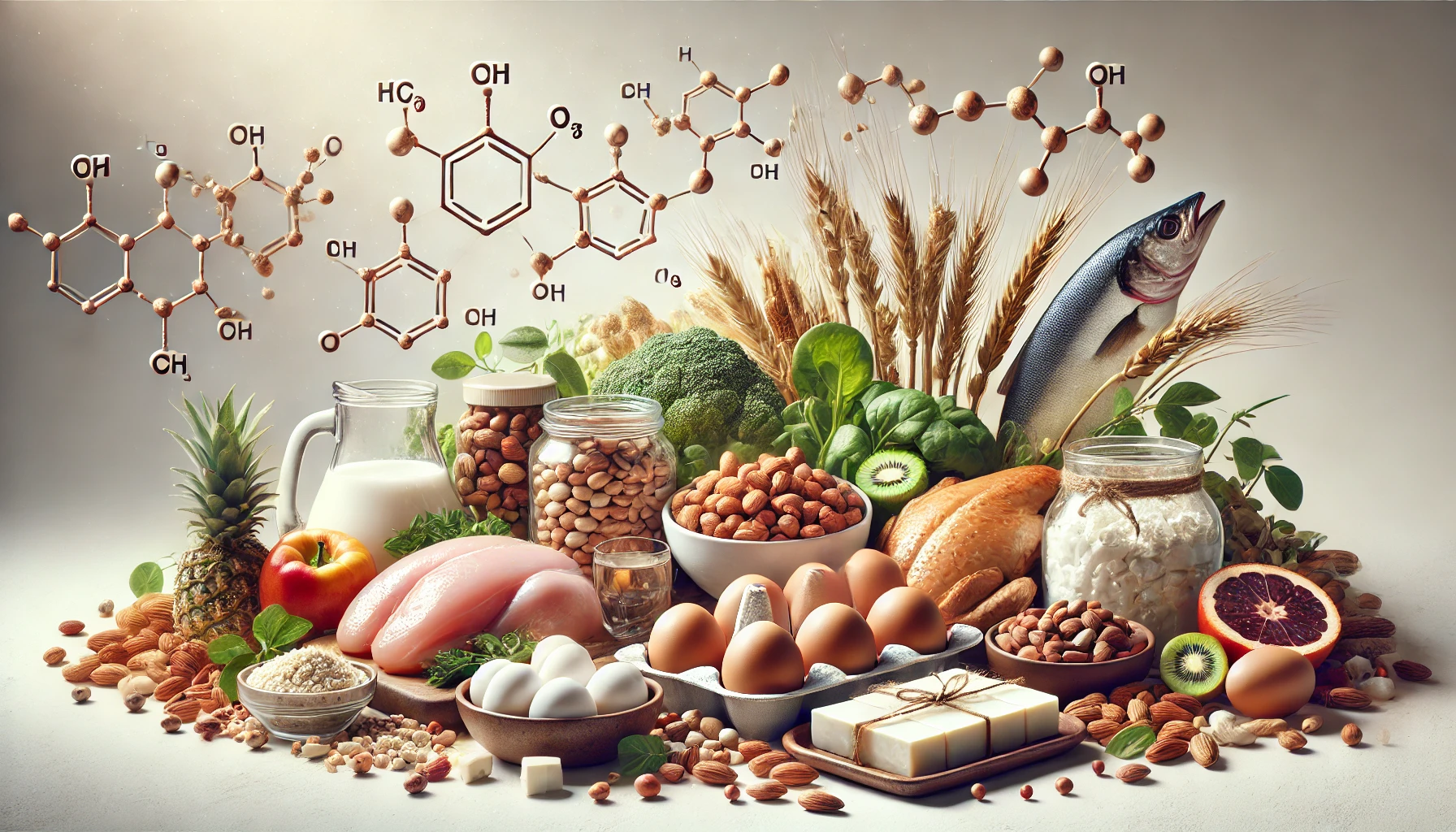Health
Understanding Amino Acids: A Simple Guide by DoctorHub360.com

Table of Contents
Introduction to Amino Acids
Definition and Importance of Amino Acids
Amino acids are the building blocks of proteins. They are tiny compounds that play a big role in keeping our body healthy. Think of them as the foundation of everything our body does. Without amino acids, we wouldn’t have strong muscles, a working immune system, or even the energy to get through the day.
Amino acids are important because they help the body grow, repair, and stay strong. They are found in the foods we eat, especially in protein-rich foods like meat, fish, eggs, and beans. When we eat these foods, the body breaks them down into amino acids to use where they are needed most.
Role of Amino Acids in the Human Body
Amino acids have many jobs in the body. They are like workers in a factory, each with a specific task:
- Building Proteins: Proteins are made of amino acids. These proteins help muscles grow and repair after exercise or injury.
- Supporting the Immune System: Amino acids help the body fight off illnesses and infections.
- Producing Energy: The body uses amino acids to create energy, especially during physical activity.
- Making Enzymes and Hormones: Enzymes are chemicals that speed up reactions in the body, and hormones help regulate processes like growth and mood.
In short, amino acids keep the body running smoothly. Whether it’s keeping our skin healthy, repairing damaged tissues, or fueling our daily activities, amino acids are essential.
This is why having a diet rich in amino acids is so important. Eating a variety of protein sources ensures the body gets all the amino acids it needs to stay healthy and strong.
Classification of Amino Acids
Amino acids are grouped into three main types based on how the body gets them. Each type has its own role in keeping the body healthy and functioning properly.
Essential vs. Non-Essential Amino Acids
-
Essential Amino Acids
- These amino acids cannot be made by the body. This means you must get them through food. There are nine essential amino acids:
- Histidine
- Isoleucine
- Leucine
- Lysine
- Methionine
- Phenylalanine
- Threonine
- Tryptophan
- Valine
Essential amino acids are vital for muscle growth, tissue repair, and energy production. Foods like meat, fish, eggs, dairy, and plant-based options like quinoa and soy are great sources.
-
Non-Essential Amino Acids
- Non-essential amino acids are made by the body, even if you don’t get them from food. They are still important but not as urgent to get from your diet. Examples of non-essential amino acids include:
- Alanine
- Asparagine
- Aspartic acid
- Glutamic acid
These amino acids support daily body functions like digestion, immune response, and brain health.
Conditionally Essential Amino Acids
Conditionally essential amino acids are usually non-essential, but they become essential in certain situations. For example, during illness, stress, or recovery from an injury, the body may not produce enough of these amino acids.
Some conditionally essential amino acids are:
- Arginine: Important during growth, wound healing, and immune system support.
- Glutamine: Helps the immune system and gut health.
- Tyrosine: Used in stress management and brain functions.
These amino acids are crucial when the body is under extra strain and may need more than it can produce on its own.
By understanding the different types of amino acids, you can better plan your diet to ensure your body has everything it needs. Eating a mix of protein-rich foods is the best way to get a balance of essential, non-essential, and conditionally essential amino acids.
Functions of Amino Acids
Amino acids are essential for many processes in the body. They perform important tasks that help keep you healthy and energetic. Let’s look at their key functions:
Protein Synthesis and Muscle Growth
Amino acids are the main ingredients for making proteins. Proteins are like the building blocks of your body. They help muscles grow, repair damage, and get stronger.
When you work out or do physical activities, your muscles experience small tears. Amino acids step in to repair these tears and build stronger muscle fibers. This is why amino acids are important for athletes, fitness enthusiasts, and anyone recovering from injury.
Enzyme and Hormone Production
Enzymes and hormones control most of the body’s functions, and amino acids are necessary to create them.
- Enzymes speed up chemical reactions in the body, such as digesting food or repairing cells.
- Hormones regulate things like mood, growth, and metabolism. For example, amino acids like tyrosine help produce thyroid hormones that manage energy levels.
Immune System Support
Amino acids play a key role in keeping your immune system strong.
- They help produce antibodies, which fight off viruses and bacteria.
- Amino acids like glutamine are especially important for repairing damaged cells and tissues.
Without enough amino acids, your body may struggle to protect itself from infections and illnesses.
Neurotransmitter Regulation
Neurotransmitters are chemicals that help your brain communicate with the rest of your body. Amino acids are needed to produce these neurotransmitters.
- Tryptophan is used to create serotonin, which helps regulate mood and sleep.
- Tyrosine helps produce dopamine, which is important for focus and motivation.
Balanced amino acids can improve mental clarity, reduce stress, and boost overall brain health.
Amino acids are not just for building muscles—they are vital for your body’s overall health. By eating a variety of protein-rich foods, you ensure your body has the tools it needs for these essential functions.
Dietary Sources of Amino Acids
Amino acids come from the foods you eat, especially those rich in protein. Eating a variety of foods ensures your body gets the amino acids it needs. Here are the main sources:
Animal-Based Proteins
Animal-based foods are some of the best sources of amino acids. They are complete proteins, meaning they contain all nine essential amino acids. Examples include:
- Meat: Chicken, beef, lamb, and pork.
- Fish: Salmon, tuna, cod, and mackerel.
- Eggs: A great source of high-quality protein.
- Dairy Products: Milk, cheese, and yogurt.
These foods are ideal for meeting your amino acid needs and supporting muscle growth, tissue repair, and overall health.
Plant-Based Proteins
Plant-based foods also provide amino acids, though not all are complete proteins. Combining different plant foods can help you get all the essential amino acids. Examples include:
- Legumes: Lentils, chickpeas, and black beans.
- Grains: Quinoa, rice, and oats.
- Nuts and Seeds: Almonds, walnuts, sunflower seeds, and chia seeds.
- Soy Products: Tofu, tempeh, and edamame are excellent plant-based protein sources.
Plant proteins are great for those following vegetarian or vegan diets and offer additional benefits like fiber and essential vitamins.
Complete vs. Incomplete Proteins
- Complete Proteins contain all nine essential amino acids. Animal-based foods like meat, fish, eggs, and dairy are complete proteins. Some plant-based options, like quinoa and soy, are also complete proteins.
- Incomplete Proteins lack one or more essential amino acids. Many plant-based proteins, like beans or grains, fall into this category.
To make incomplete proteins more effective, you can combine them. For example:
- Rice and beans.
- Peanut butter and whole-grain bread.
This combination ensures you get all the essential amino acids, even from plant-based diets.
By including a mix of animal and plant-based proteins in your diet, you can easily meet your body’s amino acid needs. Eating diverse protein sources helps support muscle growth, brain function, and overall health.
Branched-Chain Amino Acids (BCAAs)
Branched-chain amino acids, or BCAAs, are a group of three essential amino acids: leucine, isoleucine, and valine. They are called “branched-chain” because of their unique chemical structure, and they play a major role in muscle health and energy production.
Overview of BCAAs: Leucine, Isoleucine, and Valine
BCAAs are essential amino acids, meaning the body cannot produce them, so you must get them from food.
- Leucine: Helps with muscle protein synthesis, making it crucial for muscle growth and repair.
- Isoleucine: Supports energy production and regulates blood sugar levels.
- Valine: Aids in tissue repair and muscle coordination.
These three amino acids work together to support overall muscle health and energy during physical activity.
Benefits of BCAAs for Muscle Recovery and Performance
BCAAs are popular among athletes and fitness enthusiasts because of their many benefits:
- Muscle Recovery: BCAAs help repair damaged muscle fibers after workouts, reducing soreness and speeding up recovery.
- Performance Boost: During exercise, BCAAs provide energy, delaying fatigue and improving endurance.
- Muscle Preservation: They prevent the breakdown of muscle tissue during intense or prolonged physical activity.
- Weight Management: BCAAs can help maintain lean muscle mass during weight loss by minimizing muscle breakdown.
Whether you’re an athlete or someone looking to stay active, BCAAs can enhance your physical performance and recovery.
Food Sources Rich in BCAAs
You can find BCAAs in many protein-rich foods, including:
- Animal-Based Sources:
- Chicken, beef, and turkey.
- Fish like salmon and tuna.
- Eggs and dairy products, such as milk, cheese, and yogurt.
- Plant-Based Sources:
- Lentils, chickpeas, and black beans.
- Soy products like tofu, tempeh, and edamame.
- Nuts and seeds, including almonds, walnuts, and sunflower seeds.
Including these foods in your diet ensures you get enough BCAAs naturally.
BCAAs are essential for anyone focused on muscle health, recovery, and performance. Adding foods rich in leucine, isoleucine, and valine to your meals is an easy way to support your fitness and overall well-being.
Amino Acid Supplementation
Amino acid supplements are popular among athletes, fitness enthusiasts, and individuals with specific health needs. While supplements can be helpful, it’s important to understand when they are necessary and how to use them safely.
When to Consider Supplements
Supplements may be a good option when your body needs extra amino acids that you’re not getting from food. Some situations where supplementation might be considered include:
- Intense Workouts: Athletes and bodybuilders may use supplements to support muscle recovery and growth.
- Dietary Restrictions: Vegans, vegetarians, or individuals with limited protein intake might benefit from supplements.
- Medical Conditions: Certain illnesses or treatments, like recovery from surgery or muscle-wasting diseases, may increase amino acid needs.
- Aging: Older adults might take amino acid supplements to prevent muscle loss or support overall health.
Potential Benefits and Risks
Benefits:
- Improved Recovery: Amino acid supplements, especially BCAAs, help reduce muscle soreness after exercise.
- Enhanced Performance: They provide quick energy and delay fatigue during physical activity.
- Muscle Preservation: Supplements can prevent muscle breakdown during calorie restriction or prolonged illness.
Risks:
- Imbalance: Taking too many amino acids can create an imbalance in the body, affecting overall health.
- Allergies or Sensitivities: Some supplements may contain allergens or additives that cause reactions.
- Kidney Strain: High doses of amino acid supplements may put stress on the kidneys, especially in people with pre-existing conditions.
Using supplements responsibly and within recommended limits can help avoid potential risks.
Consulting Healthcare Professionals Before Use
Before starting amino acid supplements, it’s important to talk to a healthcare professional. They can:
- Assess your current diet and health needs.
- Recommend the right type and dosage of amino acids.
- Help avoid potential side effects or interactions with medications.
Professional guidance ensures you’re using supplements safely and effectively.
Amino acid supplementation can be a useful tool when natural intake isn’t enough. However, they should complement a balanced diet, not replace it. Always prioritize whole foods and consult a healthcare expert before adding supplements to your routine.
Amino Acids and Health Conditions
Amino acids play a crucial role in maintaining good health. They support various body functions, and their deficiency or imbalance can lead to several health issues. Let’s explore their impact on different health conditions.
Amino Acid Deficiencies and Their Symptoms
When the body doesn’t get enough amino acids, it can’t function properly. Here are some common symptoms of amino acid deficiencies:
- Muscle Weakness and Fatigue: Without enough amino acids, the body struggles to repair and build muscles, leading to tiredness and weakness.
- Hair Loss and Skin Problems: Amino acids are essential for healthy hair, skin, and nails. Deficiencies may cause brittle nails, hair thinning, or dry skin.
- Weakened Immune System: A lack of amino acids reduces the body’s ability to fight infections and illnesses.
- Mood Changes: Amino acids like tryptophan influence mood and sleep. Deficiency may result in irritability, anxiety, or sleep disturbances.
These symptoms highlight the importance of a balanced diet rich in amino acids.
Role in Managing Chronic Diseases
Amino acids can help in managing several chronic diseases:
- Diabetes: Amino acids like leucine can help regulate blood sugar levels and support muscle health.
- Heart Disease: Arginine improves blood flow and may help reduce high blood pressure, lowering the risk of heart disease.
- Liver Conditions: Amino acids like methionine and glutamine support liver function and repair damage caused by conditions like fatty liver disease.
- Cancer Recovery: Patients undergoing cancer treatments may benefit from amino acids to improve strength, immunity, and overall recovery.
Incorporating amino acids through diet or supplements can play a supportive role in chronic disease management.
Amino Acids in Mental Health and Cognitive Function
Amino acids are essential for brain health and emotional well-being:
- Tryptophan: Helps produce serotonin, which regulates mood and promotes restful sleep.
- Tyrosine: Supports the production of dopamine, improving focus, motivation, and stress management.
- Glutamine: Fuels brain cells and improves memory and concentration.
- Glycine: Helps calm the nervous system, promoting relaxation and better sleep.
Deficiency in these amino acids may lead to mental health challenges like depression, anxiety, and brain fog.
Amino acids are not just for physical health—they are vital for mental well-being and managing chronic conditions. By eating a balanced diet and addressing deficiencies, you can support your overall health and improve quality of life.
Recommended Daily Intake of Amino Acids
The amount of amino acids you need each day depends on various factors like age, activity level, and overall health. Understanding these requirements helps ensure your body gets the nutrients it needs to function optimally.
Factors Influencing Amino Acid Requirements
Several factors affect how much amino acids you need:
- Age: Children and teenagers need more amino acids for growth and development, while older adults may need extra to prevent muscle loss.
- Activity Level: People who exercise regularly, especially athletes or bodybuilders, require more amino acids for muscle repair and recovery.
- Health Conditions: Illness, injury, or chronic diseases can increase the need for amino acids to aid in healing and recovery.
- Dietary Choices: Vegetarians and vegans may need to pay extra attention to their amino acid intake to ensure they get all essential types.
These factors highlight why amino acid requirements vary from person to person.
Guidelines for Different Age Groups and Activity Levels
The daily recommended intake of amino acids can be met through a balanced diet. While specific amounts vary, here are general guidelines:
-
For Children and Teenagers:
- Amino acids are essential for growth and development. Ensure they get protein from milk, eggs, lean meats, and plant-based sources like beans and lentils.
-
For Adults:
- Most adults need about 0.8 grams of protein per kilogram of body weight daily. This translates to a diet rich in eggs, poultry, fish, and plant proteins.
-
For Athletes and Active Individuals:
- Athletes may require 1.2 to 2.0 grams of protein per kilogram of body weight to support muscle repair and energy needs. BCAAs and other amino acids are particularly beneficial for this group.
-
For Older Adults:
- Older adults may need more protein to prevent muscle loss, typically around 1.2 grams per kilogram of body weight. Foods like fish, eggs, and dairy are excellent options.
By understanding the factors that influence amino acid needs and following these guidelines, you can ensure your body gets the right balance of amino acids for optimal health. Prioritizing a diet rich in diverse protein sources is the key to meeting your daily requirements.
Conclusion
Recap of the Importance of Amino Acids
Amino acids are essential for your body to function properly. They are the building blocks of proteins, which play a critical role in muscle growth, tissue repair, immune support, and brain health. Amino acids are also vital for energy production, hormone regulation, and overall well-being.
Whether you’re an athlete, a busy professional, or someone focused on maintaining good health, amino acids are a key part of your diet. Both essential and non-essential amino acids work together to keep your body running smoothly, while conditionally essential amino acids support you during times of stress or illness.
Encouragement to Maintain a Balanced Diet for Optimal Health
The best way to ensure you get enough amino acids is to maintain a balanced diet rich in diverse protein sources. Incorporate a mix of animal-based proteins like meat, fish, eggs, and dairy, as well as plant-based options like beans, lentils, soy, and nuts.
Remember, supplements can be helpful in certain situations, but they should never replace whole foods. Always prioritize natural sources of amino acids for maximum health benefits.
By understanding the importance of amino acids and making informed dietary choices, you can support your body’s needs and enjoy a healthier, more active life. A balanced diet is the foundation of good health, so start today and fuel your body with the amino acids it needs to thrive.
FAQs About Amino Acids
Q1: What are amino acids, and why are they important?
Amino acids are the building blocks of proteins, which are essential for growth, repair, and maintaining overall health. They help with muscle growth, immune system support, energy production, and brain function.
Q2: What is the difference between essential and non-essential amino acids?
Essential amino acids cannot be produced by the body, so you must get them through food. Non-essential amino acids are produced by the body, but they are still important for various functions.
Q3: What foods are high in amino acids?
Foods rich in amino acids include animal-based proteins like chicken, fish, eggs, and dairy. Plant-based options include lentils, beans, quinoa, tofu, and nuts.
Q4: What are BCAAs, and what do they do?
BCAAs (branched-chain amino acids) are a group of three essential amino acids: leucine, isoleucine, and valine. They support muscle growth, recovery, and energy production during exercise.
Q5: Can I get enough amino acids from a vegetarian or vegan diet?
Yes, vegetarians and vegans can get enough amino acids by eating a variety of plant-based proteins. Combining incomplete proteins, like rice and beans, ensures you get all essential amino acids.
Q6: Do I need amino acid supplements?
Most people can get enough amino acids from a balanced diet. However, supplements may be helpful for athletes, people recovering from illness, or those with dietary restrictions. Always consult a healthcare professional before using supplements.
Q7: What happens if I don’t get enough amino acids?
A lack of amino acids can lead to symptoms like muscle weakness, fatigue, hair loss, immune system issues, and mood changes. Severe deficiencies may result in more serious health problems.
Q8: Are there risks to taking too many amino acids?
Excess amino acid intake, especially from supplements, may lead to imbalances, kidney strain, or digestive issues. It’s important to follow recommended dosages and consult a healthcare provider.
Q9: How much protein do I need daily to get enough amino acids?
The general recommendation is 0.8 grams of protein per kilogram of body weight for adults. Athletes and older adults may require more, depending on their activity level and health.
Q10: Do amino acids improve mental health?
Yes, amino acids like tryptophan and tyrosine are involved in producing neurotransmitters that regulate mood, focus, and sleep, supporting mental health and cognitive function.













